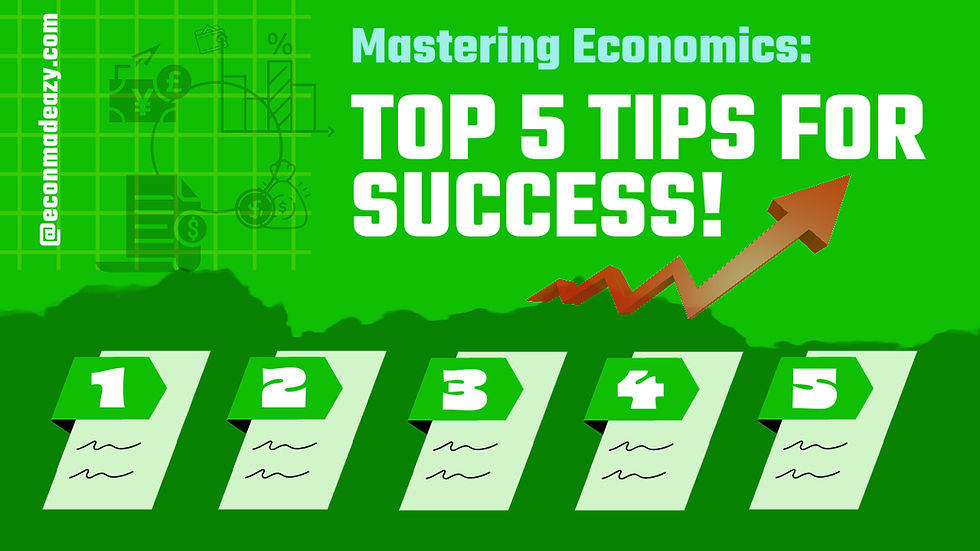
Have you ever found yourself lost in the complex theories and multi-dimensional principles of Economics? You're not alone. But fear not, because in this blog post, I'll share some strategies on how to study economics effectively and master this subject.
These strategies are drawn from my experience as a teacher with over 20 years of helping students, especially those who find academics challenging, overcome their struggles with Economics. I've seen firsthand how the right approach can transform confusion into clarity and frustration into confidence. Let’s dive in!
Economics, much like Mathematics, is a multi-dimensional discipline that necessitates cumulative learning. When you lag in your studies, it becomes increasingly challenging to grasp the newly introduced concepts and principles. Simply put, cramming will not suffice when preparing for exams as the subject can become quite complex.
Watch a YouTube video where I share these tips in more detail-1. Active Learning
Studying Economics requires an active, not passive, approach. Try to read through the chapters within a day or two of your class. With the teacher's examples still fresh in your mind, it will be easier to understand the textbook or any supporting materials. The goal here is comprehension, not memorization. Even if you have other commitments, try to do this at least weekly. And remember, textbooks are there for a reason, they help you to understand the scope of your syllabus at the level you're in. Videos and other resources can supplement your learning, but don't neglect the basic reading.
2. Highlight Keywords
As you read, have a pencil handy to highlight keywords. These keywords are like the secret language of Economics. These are important. If I use the terms, ‘motion’ or ‘acceleration’, you will immediately realize that I am talking about Physics. Similarly, Economics has it’s own language. By identifying and understanding them, you'll grasp the core ideas much more easily. The best way to approach this is to:
List the steps in each logical argument
Retrace the cause-and-effect steps in each model
Draw the graphs that represent the model
Think about the basic principles of economics and how they relate to what you are learning
Doing this even once a week will help you understand the subject at a deeper level and will make your studies more enjoyable.
3. Break It Down
Divide and conquer - break the lesson into manageable parts, and tackle each one separately. Start with the first part, revise it the next day, then move onto the next. This method reinforces your understanding and makes studying less overwhelming. This approach helps you to build connections and comparisons between concepts, and helps you to analyze and understand graphs. Graphs should not be memorized. Instead, develop a basic understanding of the concept, and you'll be able to derive your own.
4. Practice
Practice makes perfect! Completing exercises and past question papers will consolidate your knowledge and sharpen your exam skills. It's the best way to ensure you're really grasping the content. This process will enable you to gain mastery over the chapters, and by the time of final examinations, you may not need to go through each topic again because you've already internalized most of the material.
5. Consistency is Key
Maintaining a regular study and review schedule is crucial in Economics. Stick to your plan, and your efforts will pay off. Consistency helps you to understand economics because many topics are linked with each other. Whether you need to apply your knowledge to higher order thinking questions in CBSE/ISC curriculum or write essays in IB or A levels, these techniques should be helpful.
Conclusion
The students who excel in examinations all share a common quality : consistency. And they never leave their studies to the end. This is true for every subject. But, for economics, it becomes more important because one needs to build knowledge in layers.
The following skills are required to effectively study economics,
An analytical mindset.
The ability to understand and weigh a variety of arguments.
The capacity to apply theories to real-world scenarios.
These are developed only if you are well-versed with every nuance of the subject and become capable enough to start thinking, applying and synthesizing the information.
Try out these strategies with just one chapter. You'll be surprised by the difference it can make. Remember, mastering economics doesn't have to be a daunting task. With these strategies on how to study economics effectively, you'll not only survive but thrive in your Economics course! Happy studying!
For an effortless way to master Economics, make sure to check out www.econmadeazy.com.

Very well explained !!